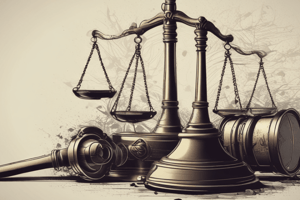Podcast
Questions and Answers
What is Criminal Law primarily concerned with?
What is Criminal Law primarily concerned with?
- Setting traffic rules
- Regulating business practices
- Defining civil disputes
- Governing crimes and sanctions (correct)
What is a key characteristic of punishment in Criminal Law?
What is a key characteristic of punishment in Criminal Law?
- It is never inflicted by the State
- It is solely for rehabilitation
- It is always lenient
- It involves a loss or pain (correct)
When is a violation of the law considered a crime?
When is a violation of the law considered a crime?
- Only if it's a serious offense
- If it results in property damage
- Whenever it causes harm to others
- When it involves punishment by the State (correct)
What justifies the infliction of punishment in Criminal Law?
What justifies the infliction of punishment in Criminal Law?
In Criminal Law, who defines crimes and offenses?
In Criminal Law, who defines crimes and offenses?
What is the main justification for Retribution according to the text?
What is the main justification for Retribution according to the text?
Which philosopher's idea does Moral Retribution follow?
Which philosopher's idea does Moral Retribution follow?
What is one of the major criticisms of Retribution in modern times according to the text?
What is one of the major criticisms of Retribution in modern times according to the text?
What is the main reason for Retribution according to the assumption of human beings possessing free will?
What is the main reason for Retribution according to the assumption of human beings possessing free will?
What does Utilitarianism, as a theory of punishment, prioritize?
What does Utilitarianism, as a theory of punishment, prioritize?
Flashcards are hidden until you start studying
Study Notes
Criminal Law Overview
- Focus on defining what constitutes illegal conduct and the framework for enforcing laws.
- Addresses behavior that is harmful or dangerous to society.
Key Characteristics of Punishment
- Punishments in Criminal Law aim to serve justice and maintain social order.
- Often involves deprivation of freedom or imposition of fines.
Definition of a Crime
- A violation of the law is considered a crime when it breachs statutes that categorize the behavior as unlawful.
Justification for Inflicting Punishment
- Justification stems from the need to uphold societal norms and deter future offenses.
- Reflects the balancing of harm done versus societal safety.
Definition of Crimes and Offenses
- Crimes and offenses are defined by legislative bodies, reflecting societal standards and moral values.
Justification for Retribution
- Retribution is primarily justified on the basis that wrongdoers deserve to be punished for their actions.
- It is influenced by the concept of moral accountability.
Philosophical Basis of Moral Retribution
- Moral Retribution is informed by the ideas of philosophers who argue for justice that aligns with moral wrongdoing, supporting the need for punishment.
Criticisms of Retribution
- A major criticism in modern discourse is that retribution fails to provide a constructive approach to crime prevention and rehabilitation.
Free Will Assumption in Retribution
- Retribution assumes that individuals exercise free will, making them accountable for their choices and deserving of punishment.
Utilitarianism in Punishment
- Utilitarianism prioritizes the greater good and overall societal benefit, emphasizing deterrence and rehabilitation over retribution.
Studying That Suits You
Use AI to generate personalized quizzes and flashcards to suit your learning preferences.




